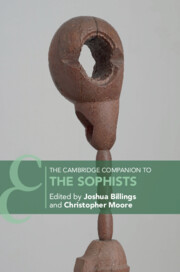Book contents
- The Cambridge Companion to the Sophists
- Other Volumes in the Series of Cambridge Companions
- The Cambridge Companion to the Sophists
- Copyright page
- Contents
- Contributors
- Note on the Text
- Introduction
- Part I Contexts
- Part II Thought
- 5 Nature and Norms
- 6 The Turn to Language
- 7 Problems of Being
- 8 Politics in Theory and Practice
- 9 Interrogating the Gods
- 10 Skills of Argument
- 11 Civic and Anti-Civic Ethics
- Part III Receptions
- Appendix: The People of the Sophistic Period
- Select Bibliography
- Index
- OTHER VOLUMES IN THE SERIES OF CAMBRIDGE COMPANIONS (continued from page ii)
10 - Skills of Argument
from Part II - Thought
Published online by Cambridge University Press: 23 December 2023
- The Cambridge Companion to the Sophists
- Other Volumes in the Series of Cambridge Companions
- The Cambridge Companion to the Sophists
- Copyright page
- Contents
- Contributors
- Note on the Text
- Introduction
- Part I Contexts
- Part II Thought
- 5 Nature and Norms
- 6 The Turn to Language
- 7 Problems of Being
- 8 Politics in Theory and Practice
- 9 Interrogating the Gods
- 10 Skills of Argument
- 11 Civic and Anti-Civic Ethics
- Part III Receptions
- Appendix: The People of the Sophistic Period
- Select Bibliography
- Index
- OTHER VOLUMES IN THE SERIES OF CAMBRIDGE COMPANIONS (continued from page ii)
Summary
The chapter argues that the antecedents of Greek philosophical interest in logical argumentation can be found in the late-fifth-century sophistical practice and teaching of technê logôn or “the art of arguments.” It assembles the extant evidence for the teaching of technê logôn by figures such as Protagoras, Gorgias, Antisthenes, Antiphon, Prodicus, Socrates, and the author of the Dissoi Logoi. Original and provocative features of technê logôn taught by these figures include: (i) the ability to produce opposing arguments on both sides of any question (antilogiai); (ii) the ability to refute any given position or argument; (iii) the ability to skillfully question another person, or to answer such questioning, on any topic; and (iv) the subject-neutral ability to produce arguments on any subject. These features would later become important elements in what fourth-century philosophers would call “dialectic,” “rhetoric,” and other successors to the fifth century “art of argument.”
- Type
- Chapter
- Information
- The Cambridge Companion to the Sophists , pp. 277 - 305Publisher: Cambridge University PressPrint publication year: 2023
- 1
- Cited by

